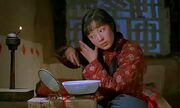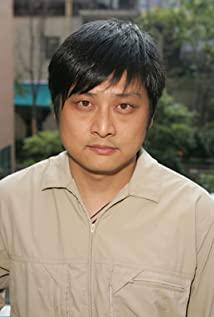Liu Daming, who had a bad relationship with his father and had been doing business in Shenzhen for many years, returned to his hometown in Beijing because of a postcard from his mentally handicapped younger brother, Liu Erming. The postcard showed their father lying on the bed. When Liu Daming returned to his hometown of Beijing, he found that his father was still running his old Beijing bathhouse, and the bathhouse was still very popular. Singing while taking a bath... It turns out that the father lying in bed in Liu Erming's painting is just sleeping.
Although Erming is mentally handicapped, he lives happily with his father, Lao Liu. They open the bathhouse during the day and run in the evening. Erming is just a child who will never grow up, but he can stay by his father's side forever, and he can also be competent in the big and small things in the bathhouse, and he can also please the guests who come to bathe from all walks of life. The bathhouse is a small community that is full of fun and humanity. It can not only take a bath and keep healthy, but also find friends for entertainment. They are all acquaintances. However, when Daming learned that his family was fine and was about to buy a plane ticket back to Shenzhen, Daming lost his younger brother who was with him to buy a ticket. This incident made Lao Liu angry and worried. When they were looking for Er Ming together, Lao Liu said to Daming: "I lost a son, I recognize it, and I can't lose all of them." It can be seen that Lao Liu does not support his son's decision to go to Shenzhen to fight to make money. But fortunately, Erming went home the next day as if nothing happened, and opened the bathhouse as usual.
Such a foggy old bathhouse, a small utopia that is almost isolated from the rapidly developing world outside, cannot escape the fate of being engulfed by the times. There was news from the district that the house was to be demolished to build a new building, and a torrential rain caught Lao Liu, who was on the roof to repair the leak, and left him with the root cause of his illness. Lao Liu finally passed away, and the bathhouse was forced to close, leaving behind Erming, who only lived in the bathhouse since he was a child. How can he live without the bathhouse? Daming sent it to a mental hospital and planned to take him to Shenzhen after he had done ideological work for his wife. But Er Ming is still like a machine with a fixed program. He gets up in the morning to open the door, mopping the floor, and at night pretends that Lao Liu is still alive and races with him. And once Erming was dragged to the mental hospital, he became a real lunatic, running around and screaming, followed by several nurses who surrounded him - people only become mentally ill when they arrived at the mental hospital. Daming had to take him back to the bathhouse and let him return to his former life. And Daming also temporarily acted as a father to open the bathhouse.
Erming lost the basis for his continued existence without the bathhouse. Without the bathhouse, he is a mentally ill person, and only a mental hospital can take him in in this society. Erming is a special person created by the special space of the bathhouse. But the house is going to be demolished after all, like the old man fighting crickets said: "As soon as the crickets leave the earth, they will not be able to survive." The crickets that entered the commercial building died in the blink of an eye. Neighbors have all moved and are distributed to commercial housing all over Beijing. The people from the moving company entered the bathroom and were sprayed out by Erming with water. I had to ask the old guests of the bathhouse that Erming knew to help move. At the end of the film, Erming stood on the bathhouse like a statue with a water pipe, and sang "My Sun" - a song that a once shy and shy guest could only perform wonderfully when taking a bath.
This movie is also a movie that considers the impact of reform and opening up on society. It has the same social background as Jia Zhangke's documentary-style films full of demolition scenes, or Feng Xiaogang's films full of dark humor and parody of commercial impact. However, the social reality of "concentrating efforts on economic construction" was pulled to a relatively distant place, and an old bathhouse in Beijing was pulled into front of the camera. In the "economic construction" society, the representative of Ming Dynasty returned from Shenzhen, wearing a suit and a wallet. At the same time, in sporadic clips, we also see He Zheng, who owes money but thinks about starting a business and making a fortune every day, and Wang Fang, the old wife of Wu who runs naked on the street for a big gold chain. The closest moment between the bathhouse and the money society outside was when debt collectors broke into the bathhouse to find He Zheng. But this was also stopped by the old man and solved it properly.
The space of the bathhouse is composed of repeated life content, the same group of customers, and almost the same entertainment activities every day. Time seems to have stopped here, and it is like a nursing home. We see many close-ups of the aging, wrinkled flesh in the bathhouse. They sit or lie down, wrapped in bath towels, rubbed, beaten, and burned. This is a place where life is maintained, nourishing both the aging body and the human mind. Not to mention that Er Ming is a mentally handicapped person who is difficult to integrate into modern society. There are also tenors who can't sing without taking a bath, and middle-aged men with impotence. They have all been recognized or treated in this bathhouse. The film goes to great lengths to capture the details of these bodies, the daily life of life, and some of the human-to-human interactions. On the other hand, Daming, who represented reform and opening up and returned home from Shenzhen, was expressionless and his eyes were dull. When I just got home, I don’t seem to know how to integrate into such a space and communicate with the people here. The details of this world are too rich, and the breath of life is as strong as the steam of a bathhouse. Daming looked at these, but it was difficult to react to it. He is alienated by the city, by the emerging capitalism. He concealed from his wife that he had a mentally handicapped younger brother. Daming was a person who could integrate into modern society by cutting off his past and forgetting his family. So after we saw Daming come home, Lao Liu had a silent but angry attitude towards him. However, as Daming slowly integrates into the bathhouse and slowly re-establishes a family relationship with his father, we see that he gradually relaxes as well.
Although Er Ming is mentally handicapped, he has vitality and energy that normal people do not have. Er Ming's strong and even slightly fat body, exaggerated expression, and stubborn personality form a sharp contrast with Da Ming, who is thin and restrained, wearing a suit. Er Ming's energy can only be released normally in the bathhouse, but in the modern world outside the bathhouse, his excessive energy is a threat and must be suppressed by violence. Therefore, he cannot be accepted by modern society.
After fully depicting the details of the various lives and bodies inside the bathhouse, the demolition came ruthlessly and quickly. If there were no Erming in the bathhouse, but only those aged people who were demolished after the death of Lao Liu, perhaps the tragedy would not be so obvious. For the guests of the bathhouse, the impact of the demolition of the new building is to make their lives empty and uninteresting. The tragedy is precisely that Er Ming's life has been rooted in the bathhouse, a time and space abandoned by the times, and he has no ability to adapt and adjust. For Erming, demolition is tantamount to murder.
View more about Shower reviews










